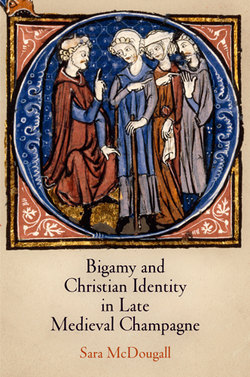Bigamy and Christian Identity in Late Medieval Champagne

Реклама. ООО «ЛитРес», ИНН: 7719571260.
Оглавление
Sara McDougall. Bigamy and Christian Identity in Late Medieval Champagne
Отрывок из книги
Bigamy and Christian Identity in Late Medieval Champagne
Ruth Mazo Karras, Series Editor
.....
What was this blessing? Gratian described the nuptial blessing as one that we have had cause to study before in this chapter: God’s blessing of Adam and Eve in Genesis 1:28, the injunction “be fruitful and multiply.”71 As Philip Reynolds has argued, use of this blessing by a priest evoked the doctrine that no man should separate what God had joined.72 This distinction, if employed by dutiful priests, offered the lay public a clear demarcation between the two kinds of marriage, as well as a sort of invitation to recognize this difference and to shame their neighbors when they married in less holy circumstances than provided by first marriages.
We also have further evidence that the presence—or absence—of the nuptial blessing mattered. As James Brundage explains, parishioners often asked priests to give them the nuptial blessing regardless of their status. Priests had to decide how to handle couples entering into second marriages who sought the nuptial blessing despite the prohibition. Apparently, these priests often granted their parishioners’ requests and presumably were often well paid for their willingness to grant their parishioners’ wishes. This happened so often, in fact, that the commissions given papal legates and nuncios regularly included the power to dispense clerics from the irregularity they fell into by giving the nuptial blessing at second marriages.73 The work of Jean-Baptiste Molin and Protais Mutembe on marriage rituals in France offers further evidence of the importance of the nuptial blessing. In northern France, priests seeking to avoid incurring irregularity and to appease their parishioners conferred different blessings to replace the forbidden one and recited the new benediction at a different point in the ritual.74
.....